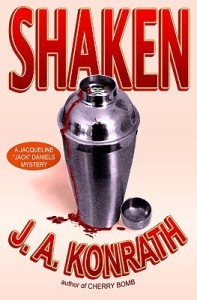Category Archives: J.A. Konrath
A Bad Idea
There is a saying in the military that there is no such thing as friendly fire. Just so; accordingly, I don’t quite know what to call, or how to classify, a recent story which is moving around literary circles; at least, I don’t know what to call it and remain polite. A “bad idea” doesn’t quite cover it.
J.A. Konrath has been one of the first authors to turn water into wine in the literal sense with respect to e-publishing. While I wouldn’t always entirely trust Joe with driving directions, he is always worth reading and yes, worth listening to, even if you don’t go along with every idea he has. Joe went from A to C without stopping first at B while figuring out how to use the new technology to not only keep his audience but also broaden it, and to make even more money while doing so. The result is that he has an almost overwhelming e-book and short story bibliography, under his own name, under pseudonyms, and in collaboration with others (most notably Blake Crouch, a master scribe in his own right). Konrath, notwithstanding his e-book success, also has an enviable backlist of physical books in print, and has also just signed a deal with a little outfit called amazon.com which is going to publish a new book of his, co-authored with Crouch, in both print (under their Thomas & Mercer imprint) and e-book format.
Now we get to the “bad idea” which I referenced above. The call has gone out on the bulletin board of one of those common interest groups for independent booksellers to 1) boycott the Thomas & Mercer imprint in general and 2) send their stocks of Konrath books back in particular. Whoever thought of this must be a descendent of the British general who during the American Revolutionary War insisted that the Redcoats attack while marching, bunched up together, in rows, the more easily to be mowed down by that aforementioned fire, friendly and otherwise. It would be foolish to do this to any author, barring evidence of the practice of pederasty or some similarly reprehensible activity; I mean, does an independent bookseller actually want to drive traffic to a local superstore by proudly announcing that they won’t be carrying a particular author’s books? It is doubly foolish to do this with Konrath, who has historically been one of the independent’s best friends. Konrath at one point in the not-so-distant-past generously laid out for one and all the manner in which he efficiently visited as many libraries and out of the way bookstores as he could on a book tour using his GPS. He also personally thanked what seemed to be thousands of librarians and booksellers, by name, at the conclusion of one of his recent novels. Booksellers, you’re gonna ban this guy? He turned one of his books into the equivalent of a sandwich board for you.
Booksellers should understand that Konrath is not the illness that threatens their business. He’s not even a symptom. He’s simply figured out a way to adapt. You should be inviting him in to sign his backlisted novels and yes, his new book with Thomas & Mercer when it is published, and to do readings (the man is enormously entertaining, even when, alas, unintentionally so) for your customers. He has the capacity to drive business into your store, not away from it. Who knows, your customers who come in to seeKonrath might buy some books by other authors as well. They’re not going to do that if you’re chasing off Konrath or any other author who has figured out a way to embrace this new medium. It’s an ancient saying, but still true: you draw more flies, and readers, with honey than with vinegar. Or boycotts.
Konrath & AmazonEncore strike a deal
I’m a huge fan of Joe Konrath‘s ‘Jack’ Daniels series (written under “J. A Konrath”). So it was with tremendous excitement that I read this news:
Amazon.com, Inc. today announced that AmazonEncore, Amazon’s publishing imprint, will release the newest book in bestselling author J.A. Konrath’s Jacqueline “Jack” Daniels series, “Shaken.”
This is a huge step forward, both for Joe and for Amazon’s imprint, which traditionally has only published reprints of self-published books by new authors, not original titles from known authors.
Clearly Amazon is now throwing the gauntlet to the traditional publishing houses, starting with a writer who has already  carved out a name for himself by publishing over a dozen books using Amazon’s Digital Text Platform (in addition to his success in the traditional publishing milieu).
carved out a name for himself by publishing over a dozen books using Amazon’s Digital Text Platform (in addition to his success in the traditional publishing milieu).
Joe played coy regarding the actual details of his advance with AmazonEncore, saying only that he received a very favorable contract. The digital version of the book will be available on Kindle four months before the print version.
So what does it all mean? It brought to mind an interview a few weeks ago with a Newsweek editor. Responding to the news that Newsweek had been offered for sale, he said that he felt they’d been doing things backward in recent years, compiling a weekly magazine while simultaneously offering daily articles on Newsweek.com. In the future, he thinks the most viable model will be to start with the daily articles, compiling the most popular into a print edition at the end of every week for readers (such as myself) who prefer reading in print form.
In other words, the online content will drive the print content, not vice versa.
Coming on the heels of my post last week about the recent uptick in digital vs. print sales, this was big news. I’ve felt for a long time that if Amazon got their act together by offering Kindles at a lower price point (which hasn’t happened yet, but must be on the horizon), they could easily position themselves to dominate the industry, effectively cutting out traditional publishing houses. They already have massive marketing and distribution resources at their disposal. All they’d have to do was hire a team of editors, and offer the mainstays of the industry (Patterson, King, Child, Steel, etc) a larger percentage of the royalties. As Konrath says in his press release, “[This] company can email every single person who has every bought one of my books through their website, plus millions of potential new customers. I’ve never had that kind of marketing power behind one of my novels. I’d be an idiot not to do this.”
As with the music industry, what I suspect will end up happening is a consolidation of the various houses into a few major players (with, most likely, Amazon, Barnes and Noble, and Apple among them). A few months ago the industry seemed to wake up to this threat, leading to the “agency model” battles between MacMillan and Amazon. (The “agency” model is based on the idea that the publisher, not the vendor, is selling to the consumer and, therefore, setting the price.)
I think that in the end what the publishers need to fear is not that Amazon will set the prices for their new releases, but that they’ll take them over entirely.
I’m not saying this is good news for writers-it remains to be seen if this will lead to a larger publishing base, or a more narrow one. But it does appear to be the first volley over the decks in the coming battle.



